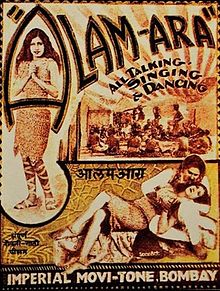Alam Ara
| Movie | |
|---|---|
| Original title | Alam Ara |
| Country of production | India |
| original language | Hindi - Urdu |
| Publishing year | 1931 |
| length | 124 minutes |
| Rod | |
| Director | Ardeshir Irani |
| script | Joseph David , Ardeshir Irani |
| production | Imperial Movietone |
| music | B. Irani , Ferozshah M. Mistri |
| camera | Adi M. Irani |
| cut | Ezra Mir |
| occupation | |
| |
Alam Ara ( Hindi आलम आरा ālam ārā ; Urdu عالم آرا) is an Indian feature film by Ardeshir Irani from 1931. It is considered India's first sound film and is in Hindi / Urdu.
action
The story is about a royal family from the Kingdom of Kumarpur. The old king lives there with his two wives, Dilbahar and Navbahar, who are constantly fighting. The situation escalates when a fakir prophesies that Navbahar will give birth to the king's heir.
Dilbahar then tries in vain to forestall this and seduce the army chief Adil. In revenge, she destroys his family and puts him in prison. His daughter Alam Ara is banished and raised by nomads. They later storm the palace, reveal Dilbahar's machinations, free Adil and Alam Ara marries the prince of the empire with whom she fell in love.
background
Alam Ara was inspired by Rodgers and Hammerstein's Show Boat .
Alam Ara was produced by Irani's company Imperial Movietone under the guidance of the American sound engineer Wilford Deming and using the Tanar Sound System introduced from the West, which recorded images and sound with one device, but was no longer used in Indian film as early as the mid-1930s . The film premiered on March 14, 1931 in Esoofally's "Majestic Theater" in Bombay and Alam Ara won the race of the production companies for the first Indian sound film just before Madan Theaters ' large-scale production Shirin Farhad , which, however, became commercially more successful. These first sound film productions established the musical type of the Indian mainstream film with music, song and dance. The story is based on Joseph David's Parsian play of the same name .
Directed by Nanubhai Vakil , Alam Ara (1956) and Alam Ara (1973) were two other films of the same name of the play.
The film is lost .
music
The film had seven vocal numbers, of which Wazir Mohammed Khan's Dede khuda ke naam par pyare was particularly popular. The song made use of a commenting choir; a technique that was also widely used later. The actors sang themselves, the playback system with external singers was only introduced in the mid-1930s.
| song | Singer |
|---|---|
| Badla Dilwaayega Yaarab Tu Sitamgaaron Se | Zubeida |
| De De Khuda Ke Naam Pe Pyaare Taaqat | Wazir Mohammed Khan |
Web links
- Alam Ara in the Internet Movie Database (English)
- Information about the film (English)
- When the stars talked in The Hindu on March 17, 2006
Individual evidence
- ↑ http://filmsound.org/india/
- ^ A b Ashish Rajadhyaksha, Paul Willemen: Encyclopaedia of Indian Cinema, p. 253
